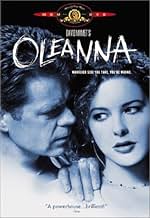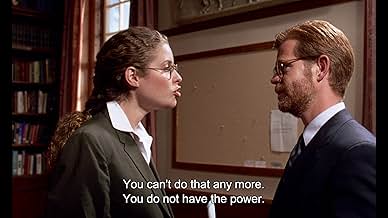NOTE IMDb
6,5/10
3,8 k
MA NOTE
Ajouter une intrigue dans votre langueWhen a student visits her professor to discuss how she failed his course, the discussion takes an awkward turn.When a student visits her professor to discuss how she failed his course, the discussion takes an awkward turn.When a student visits her professor to discuss how she failed his course, the discussion takes an awkward turn.
- Réalisation
- Scénario
- Casting principal
- Récompenses
- 1 nomination au total
Diego Pineda
- Quarterback
- (non crédité)
Scott Zigler
- Clerk in Copy Shop
- (non crédité)
Avis à la une
This film is basically about a student who cannot accept she's failing class and decides to ruin her teacher's life by framing him. Around this basis, a quite witty dialogue is unfolded, which makes the movie intellectually stimulating and powerful. Additionally, it depicts the invalidity of some axioms of both professor and student community and portraits how people manipulate the truth to serve their personal interests. A very strong point is how pompous and cliche arguments about void pseudo-liberties alienate people from truly disastrous and desperate situations. As I see from other reviews, the play was much better, but unfortunately we didn't have the chance to see it here in Greece yet, so my first impression of Mamet's work was from this movie.
William H. Macy plays a professor, and Debra Eisenstadt plays a student who needs an A in the class she is taking from him. They argue as to why she should or shouldn't get an A. In the course of their arguing, the student finds cause to charge the professor, who is up for tenure, with sexual harassment and takes her case to the tenure committee.
The movie runs about an hour and a half. It was slow going, but as I was about to flip away from it (watching it on cable), I checked how long it had to go, and it was about half-way through. I figured, oh well, there's still some Canadian Club I need to get rid of, and tomorrow's a holiday, so I stuck with it. And I'm glad I did.
It is not a good movie, and maybe not even a very good play. Mamet's direction is ultra-stagy, even more declamatory than live theater would normally allow for, let alone a movie. For about an hour and a half, the actors hurl complete sentences and big chunks of paragraphs at one another.
Are Mamet and the actors really that insensitive to the conventions of film? Not likely. I think he chose that artificial manner in order to distance the audience from the characters and bring the ideas to the foreperhaps in the same vein as Bertolt Brecht's notion of "epic theater".
This is not so much a movie or a play as it is a staged philosophical dialogue. It examines the power relationships between man and woman, teacher and student. When the student comes to the professor to reveal the case she has built against him, it shows how words and deeds in one context can be given a whole different thrust and meaning when used to "build a case". Or are they really that different? Perhaps her case focuses and explicates the real underlying relationship of those words and deeds. Those are the kinds of questions Mamet raises, and I think it is a masterful exploration.
But is it a movie? Well, it is certainly dramatic, if stilted, and the dénoument is devastating. It may not be a good movie, but Mamet knew exactly what he was doing, and I'd watch it again.
The movie runs about an hour and a half. It was slow going, but as I was about to flip away from it (watching it on cable), I checked how long it had to go, and it was about half-way through. I figured, oh well, there's still some Canadian Club I need to get rid of, and tomorrow's a holiday, so I stuck with it. And I'm glad I did.
It is not a good movie, and maybe not even a very good play. Mamet's direction is ultra-stagy, even more declamatory than live theater would normally allow for, let alone a movie. For about an hour and a half, the actors hurl complete sentences and big chunks of paragraphs at one another.
Are Mamet and the actors really that insensitive to the conventions of film? Not likely. I think he chose that artificial manner in order to distance the audience from the characters and bring the ideas to the foreperhaps in the same vein as Bertolt Brecht's notion of "epic theater".
This is not so much a movie or a play as it is a staged philosophical dialogue. It examines the power relationships between man and woman, teacher and student. When the student comes to the professor to reveal the case she has built against him, it shows how words and deeds in one context can be given a whole different thrust and meaning when used to "build a case". Or are they really that different? Perhaps her case focuses and explicates the real underlying relationship of those words and deeds. Those are the kinds of questions Mamet raises, and I think it is a masterful exploration.
But is it a movie? Well, it is certainly dramatic, if stilted, and the dénoument is devastating. It may not be a good movie, but Mamet knew exactly what he was doing, and I'd watch it again.
This is a movie not without faults -- the dialog at the beginning is stilted, William H. Macy's performance is not without its weak spots -- but in spite of those quibbles, is a compelling, intriguing film.
The movie centers on the relationship between a student and a professor at an unnamed university. She goes to him for extra help in his class (but she may be just trying to set him up for a sexual harrassment lawsuit). He tries to help her with her studies (but may be trying to dominate and have innappropriate relations with her at the same time). As the relationship turns into a struggle, the viewer finds him/herself switching sides early and often. The tension in the film becomes the viewer's tension; during the final scenes you'll barely breathe.
The tagline is right -- whatever side you choose, you're wrong. I've seen this movie lambasted as being anti-feminist, lauded for being pro-feminist, hated for being anti-establishment, pro-establishment, racist, sexist, etc. In reality, it is all and none of these things. Oleanna is a mirror that forces us to examine and discuss our own convictions. That it accomplishes this while still being an exciting film makes it worth seeing more than once.
The movie centers on the relationship between a student and a professor at an unnamed university. She goes to him for extra help in his class (but she may be just trying to set him up for a sexual harrassment lawsuit). He tries to help her with her studies (but may be trying to dominate and have innappropriate relations with her at the same time). As the relationship turns into a struggle, the viewer finds him/herself switching sides early and often. The tension in the film becomes the viewer's tension; during the final scenes you'll barely breathe.
The tagline is right -- whatever side you choose, you're wrong. I've seen this movie lambasted as being anti-feminist, lauded for being pro-feminist, hated for being anti-establishment, pro-establishment, racist, sexist, etc. In reality, it is all and none of these things. Oleanna is a mirror that forces us to examine and discuss our own convictions. That it accomplishes this while still being an exciting film makes it worth seeing more than once.
One general misunderstanding (in my opinion) of Mamet is that he tries to write realistic dialog. In Oleanna, Mamet seems to want to speak directly through each character in a very academic verse which is well suited to the film/play. The issues of sexual misconduct and the way perspectives differ between men and women make this an interesting journey. And if you are a Bill Macy fan, you will like the movie.
Unique, hyper-real film where the dialogue is the main plot - and what a rivetting plot it is. I was very skeptical about Oleanna, and was really resistant to it - but was very surprised to find myself succumbing to it. If you love language, and know enough language, Oleanna will be a joy for you: because the dialogue is loaded with jokes about dialogue. You'll be able to pick the places where Bill Macy is saying non-words, pretentious words or jargons in his monologues - and notice where somebody is talking ambiguously, or not saying anything at all.
Its about words, talking and meaning. So there are lots of words for good reason.
Its very dialoguey dialogue: not the kind of things people say, but the kind of things writers write. Reminiscent of the verbal gymnastics of Samuel Beckett, and the twisting meanings of Catch-22. Or perhaps the comedic pretentiousness of Hal Hartley. Meaning is controlled by the powerful - that's the key. Whoever controls the conversation, the language, in this movie - controls the situation. So everything is either ambiguous or figurative. Mainly, the exact things the two say are not what's key. Its which one of them is talking.
The performances - well, Macy at least - are in an appropriately hyper-real tone to suit the hyper-real dialogue. The girl is not very good, but this is still a masterpiece of language. Its static, centring on two characters and one room, but for good reason - to put the words centre stage. I'm so shocked that i just watched a movie with two characters and one room, and was not only not bored once, but hanging on each word and found that the time flew by.
The moral of the story is that things are bound to go wrong if you talk to somebody for the length of an entire movie. You're bound to go nuts. The viewer is bound to go nuts just listening to William H Macy in the first half-hour of the movie - you'll be amazed that purely talking to someone, using words, can make you feel that you're trapped, that you can't win or even escape.
Quite brilliant, really.
8/10. Essential viewing. I never knew dialogue held this power. A unique discovery.
Its about words, talking and meaning. So there are lots of words for good reason.
Its very dialoguey dialogue: not the kind of things people say, but the kind of things writers write. Reminiscent of the verbal gymnastics of Samuel Beckett, and the twisting meanings of Catch-22. Or perhaps the comedic pretentiousness of Hal Hartley. Meaning is controlled by the powerful - that's the key. Whoever controls the conversation, the language, in this movie - controls the situation. So everything is either ambiguous or figurative. Mainly, the exact things the two say are not what's key. Its which one of them is talking.
The performances - well, Macy at least - are in an appropriately hyper-real tone to suit the hyper-real dialogue. The girl is not very good, but this is still a masterpiece of language. Its static, centring on two characters and one room, but for good reason - to put the words centre stage. I'm so shocked that i just watched a movie with two characters and one room, and was not only not bored once, but hanging on each word and found that the time flew by.
The moral of the story is that things are bound to go wrong if you talk to somebody for the length of an entire movie. You're bound to go nuts. The viewer is bound to go nuts just listening to William H Macy in the first half-hour of the movie - you'll be amazed that purely talking to someone, using words, can make you feel that you're trapped, that you can't win or even escape.
Quite brilliant, really.
8/10. Essential viewing. I never knew dialogue held this power. A unique discovery.
Le saviez-vous
- AnecdotesDavid Mamet's script was heavily criticized as sexist. He defended himself against this allegation in (Guardian supplement) (UK) 8 April 2004, pg. 8-9, "'Why can't I show a woman telling lies?'"
- GaffesWhen Carol leaves John's office after their second meeting, shouting "Help!", the shadow of the camera covers the door.
- Versions alternativesThere is a version of the movie circulating in Australia, in a series of videos along with other David Mamet films including "A Life in the Theater". This particular copy of the film is timecoded. In that version, after Carol tells John not to call his wife "baby," (thus sending him into a torrent of rage), and he slaps her arm and grabs her, screaming a sexual expletive and raising a chair above her head, the door to the hallway swings open and a number of people stand in the hallway, observing the fight and thus hopelessly damning John. In the version now appearing on The Sundance Channel (10/05), the expletive is unchanged but he never lifts the chair and the door never opens; aside from a final exterior shot of the school, the film ends with Carol (Eisenstadt) having collapsed on the floor of John's office, and John sitting in his chair, his head buried in his hands.
- Bandes originalesLong Ago And Far Away
Words by David Mamet
Music by Rebecca Pidgeon
Soloist: Steve Goldstein (as Steven Goldstein)
© Copyright 1994 Dwight Street Music
Meilleurs choix
Connectez-vous pour évaluer et suivre la liste de favoris afin de recevoir des recommandations personnalisées
- How long is Oleanna?Alimenté par Alexa
Détails
- Date de sortie
- Pays d’origine
- Sites officiels
- Langue
- Aussi connu sous le nom de
- David Mamet's Oleanna
- Lieux de tournage
- Sociétés de production
- Voir plus de crédits d'entreprise sur IMDbPro
Box-office
- Montant brut aux États-Unis et au Canada
- 124 693 $US
- Week-end de sortie aux États-Unis et au Canada
- 25 316 $US
- 6 nov. 1994
- Montant brut mondial
- 124 693 $US
Contribuer à cette page
Suggérer une modification ou ajouter du contenu manquant











